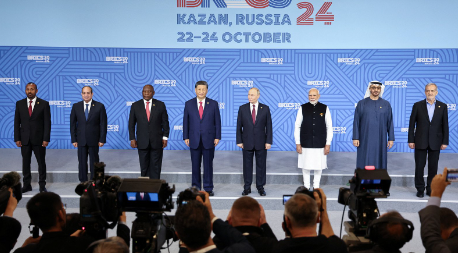All the BRICS is a Stage (GS Paper 2, Polity)

Context: BRICS Summit
- The recent BRICS Summit serves as a prime example of how political gatherings function not merely as platforms for dialogue but as orchestrated performances that convey power dynamics and ideological stances among member nations.
Nature of Political Summits
- Political summits, such as those held by BRICS, are often characterized by their performative nature.
- These events are heavily staged and meticulously choreographed, serving multiple purposes beyond mere policy formulation.
- They are akin to theatrical productions where the leaders of participating nations showcase their unity, resolve, and shared interests to both domestic and international audiences.
The Performative Aspect
- Public Demonstrations: The more visible and publicized the event, the greater the emphasis on demonstrating solidarity. Leaders engage in rituals of handshaking, photo ops, and joint statements that project an image of unity, even if the actual discussions are more complex and nuanced.
- Messaging Over Substance: The joint communiques released at these summits often serve as lengthy declarations addressing global issues. While they may outline shared goals or principles, they frequently lack concrete actionable steps. The focus is on the optics of solidarity rather than on delivering specific outcomes.
Key Performances at the BRICS Summit
Staging of BRICS
Each BRICS Summit must reaffirm the bloc's existence and relevance in a rapidly changing geopolitical landscape. This involves:
- Demonstrating Cohesion: The collective presentations aim to signal that BRICS is a united front against Western hegemony, showcasing a shared commitment to addressing global challenges collectively.
- Optics of Success: Leaders aim to present a narrative of success and collaboration, despite internal divergences. This reinforces the idea that BRICS can serve as an effective counterbalance to traditional power structures dominated by the West.
Staging for Domestic Audiences
Beyond international optics, the summits are critical for domestic politics:
- Affirming Authority: Leaders showcase their capability to engage with global powers, reinforcing their legitimacy at home. Sitting alongside other prominent leaders elevates their status and serves to reassure domestic constituents of their global standing.
- Public Perception: By participating in these high-profile events, leaders communicate to their citizens that they are active players on the world stage, enhancing their domestic political narratives and boosting national pride.
Anti-Westernism and Anti-Americanism
A defining characteristic of the BRICS Summits is the articulation of anti-Western sentiments, particularly towards the United States. This collective stance involves:
- China's Role: As the largest economy within BRICS, China often takes the lead in promoting narratives that challenge U.S. policies, presenting itself as a champion of multipolarity.
- Russia's Position: Russia's vocal criticism of Western actions resonates with other BRICS nations that share grievances, thereby creating a unified front against perceived Western imperialism.
- Diverse Grievances: Each member country brings its unique concerns to the table, whether they be economic sanctions, political interference, or historical injustices, creating a mosaic of dissent against Western dominance.
Signalling and Messaging
The BRICS platform enables member countries to convey strategic messages to the global community:
- Russia: Uses its participation to demonstrate that it remains a significant player, countering narratives of isolation due to Western sanctions.
- China: Positions itself as a leader advocating for a new world order, one that offers alternatives to Western hegemony and prioritizes development and cooperation among emerging economies.
- India: By participating actively, India asserts its role as a key player in international affairs, reminding Western powers of its diverse partnerships and independent foreign policy choices.
Impact of BRICS' Anti-Western Stance on Global Politics
The collective anti-Western sentiment expressed at BRICS Summits has significant implications for global governance:
- Checks and Balances: By fostering a multipolar world, BRICS provides smaller and developing nations with a platform to assert their interests against the dominance of a single bloc, particularly the West.
- Space for Maneuvering: This multipolarity allows countries to engage with various alliances, creating a more flexible and comfortable international environment, where smaller states can pursue their national interests without fear of being sidelined.
Conclusion
- The BRICS Summit is not merely a series of discussions; it represents a theatrical display of potential alternatives to the existing global order.
- The performances at these summits are critical for signaling the aspirations of emerging economies and projecting an image of unity and resistance against Western hegemony.
- Understanding the nuances of these gatherings reveals that, while they may lack in immediate substantive outcomes, they play a pivotal role in reshaping international politics.
- By framing their collective narrative, BRICS countries are signaling a willingness to explore new avenues for cooperation and governance in an increasingly complex world.
- This makes the BRICS Summit a vital stage in the ongoing evolution of global politics.


